- Home
- Karen Hesse
Letters From Rifka Page 3
Letters From Rifka Read online
Page 3
They were good potatoes, Tovah. Since I have been sick, everything tastes good. How skinny I’ve become. But not Saul; he is as big as a horse. His legs have grown so long just since we left Russia. You should see how they sprout from his pants.
Even with all my things on, my underwear and my two extra dresses, and my cloak and shawl, I still do not look fat. Remember how in Berdichev the Russian guards would come to inspect the homes of the Jews? They made certain we owned no more than our allowance. Always, when the guards were coming, Mama would say, “Rifka, put all your clothes on.” I would rush and throw my dresses over my head and stand out in front of the house to watch.
The guards would search through our rooms. They did not find more than two of anything. How could they find anything extra in our house? In your house there are many fine things, Tovah, but they never inspected your house.
The guards would look at me, layered in all my belongings, and say, “Hmmm, fat kid.” With my dresses and my cloak and my shawl piled on top of me, I looked as short and round as a barrel.
I am no longer round, but I am still short. I wonder if I will ever grow, Tovah. Maybe it will be all right that I am short in America. If I could get Bubbe Ruth to come, there would at least be two of us.
If I could get Bubbe Ruth to come. She does not stay because she is comfortable and safe like you and Hannah and Uncle Avrum. Bubbe Ruth stays because she is afraid to leave, afraid for things to change. I am afraid too, but not so afraid that I want to come back.
I would like it best if you and Hannah and Uncle Avrum and Aunt Anna and Bubbe Ruth and all the others were coming to America too. I am trying to be clever, Tovah, but how much more clever I could be surrounded by my family.
Shalom, my cousin,
Rifka
… In hope, in torment, we are turning Toward freedom, waiting her command …
—Pushkin
November 27, 1919
en route to Warsaw
Dear Tovah,
Many of the typhus patients at the hospital in Motziv died. We all survived. Now, at last, we are on our way to Warsaw. All of us—me, Mama, Papa, Nathan, and Saul.
Warsaw is where we pick up the money for our steamship tickets. My older brothers, Isaac and Reuben and Asher, have worked hard to save the money so we could join them in America. These other brothers of mine, they left Russia fourteen years ago, before my birth. Do you even remember them, Tovah?
They are my brothers, my family, but I don’t know them. Papa showed me their letters. In my mind the letters came from strangers living in a distant land.
Then, only the day before we fled from Russia, the Red Cross posted the message on the board. Isaac and Reuben and Asher, they were sending for us. Remember how I ran to tell you our news? I wonder, Tovah, if the message still hangs there in the center of the village.
I am certain Warsaw is a wonderful city. When people in Motziv say the word “Warsaw,” their voices deepen and they give a little kick on the end, like this: “Warsaw—ha!” It reminds me of the way we do in Berdichev when we speak of America.
Our train passes small herds of cattle grazing on yellowed grass and I remember the cows of Berdichev. The peasant girls drove them along the road past our house every night at sunset. Those cows were not bony as these are. I loved sitting on the front step watching the fat brown beasts lumber past. The earth shivered beneath their clopping weight as the sun set in a ball of fire. Those girls sang in such beautiful harmony.
When I read your Pushkin, I remember those cows, and the girls’ singing.
Poland is so cold and flat and colorless. Only pine trees, scrubby, wretched pine trees, sweep past the window of the train. Maybe in the spring it is better, maybe there are flowers. Maybe the sky is something other than gray. Now, it is nearly December, and I shiver at the cold of Poland.
It is odd to see Mama and Papa and Nathan so changed. In Berdichev, Mama kept us all well on practically nothing. You know what a baker she is. Always the smell of yeast clung to her.
Many times she would send me to your house with a basket of pastries or a cake, or her thick dark bread. There is no baking for her now.
Papa’s dark eyes have lost their spark since the typhus, and Mama’s long black hair does not shine as it once did. Even Nathan, with his thick black curls and his strong dimpled jaw, has hollowed cheeks and circles beneath his eyes. I cannot tell how I look, but Mama sometimes strokes my cheek and sighs. Her fingers are bony and rough.
Only Saul still glows with health from his clumsy feet to his big red ears.
I must tell you of this noisy, crowded, stinking train we are riding north out of Motziv. The freight train from Berdichev was more comfortable. Here people push against one another on every bench. The cars are drafty and reek of old bedding. Between the chugging and the clacking tracks and the endless Polish babble, the noise never stops pressing against you. Worse still, there is no place to relieve yourself and I drank two cups of tea before we boarded. I could not sit still a moment longer.
“I am going for a walk,” I told Mama.
Mama nodded, still chewing slowly her lunch of cold potato and roll. I had finished the last bite of mine long ago.
At the back of our car a peasant girl sat on a bench with a baby sucking at her breast. At first I thought the girl was older, but when she looked up, I saw she was your age, Tovah, near sixteen.
Her blond hair hung thinly down from her kerchief, tickling the baby’s bald head. The baby’s fingers played on the girl’s cheek as it nursed.
The girl noticed me staring. “You like babies?” she asked in Polish, talking over the heads of the passengers beside her.
I nodded and fiddled with the knot of my kerchief.
“You have beautiful hair,” she said. “Mine …” She took her free hand and flipped the wisps of hair over her shoulder. “My sister used to fix my hair. Until she married and moved away. I am going to visit her now, my sister.”
I do not know what made me offer. Maybe it was the sweetness of the baby, maybe the friendliness of the girl. “I used to fix my cousin’s hair,” I said in Polish. “I could fix yours so you will look nice for your sister … if you’d like.”
She was happy to let me fix her hair. I pushed into the narrow space between the bench and the back of the train car and removed her kerchief.
Her head stank. Strands of hair clustered in oily clumps. Most terrible, though, were big round sores all over her scalp.
My fingers hesitated. I did not wish to touch the girl’s head, yet neither did I wish to insult her. I gathered the ends of her hair and began unknotting the tangles.
Tilting her head back, the girl sighed as I worked my fingers through the snarls.
The baby pulled its mouth off the girl’s breast and looked up at me. Its mouth opened into a milky smile.
“You have a nice baby,” I said.
The girl turned and looked me over. “You are not Polish.”
I was afraid everyone on the train heard her. I worried they’d send me back to Berdichev as the Polish border guards had threatened, or that they’d chase me away as the nurses did in Motziv. To my relief, the other passengers ignored us and the girl turned back around.
“I am from Ukraine,” I whispered. “I am going with my family to America.”
“America!” the girl said. “America.”
The man sitting beside her inched away, forcing an old woman on the end of the bench to plant her feet firmly on the floor to keep from falling.
“America,” the girl repeated. “What will you do there?”
I was silent for a little time.
“I will do everything there,” I answered.
The girl threw back her head and laughed. Standing over her, I saw that several of her teeth were missing.
She said, “Why would you want to go to America? You can do everything you want right here. I would never leave Poland.”
“Never?” I asked.
“I can’t imagi
ne going out my door and finding anything else. Look at it out there. That is home.”
I looked out the train window. There was a boy running across a frozen field with a black dog loping along at his side. For a moment I saw Poland as she saw it.
Then my eyes saw the bleakness outside the window again and I felt a chill creep down my spine.
“There,” I said, smoothing out the last tangle from her hair and backing away shyly. “I must return to my family.”
She put a finger to her lips, revealing a cracked and reddened nail. Her baby slept with its little nose squashed against her breast.
“Good luck to you in America,” she whispered.
I stumbled back up the aisle of the lurching train, thrown against this one’s shoulder, squeezing past that one. The smell of cheese filled the car. My mouth watered at the stench of it.
I slid back into my place between Mama and Nathan and looked around at the other people in the car, listening to their conversations.
I felt your Pushkin inside my rucksack and I wanted to get it out and write my thoughts. I am filling the pages of our book quickly, Tovah, even with my writing so small and fine.
“Mama?” I asked, feeling her elbow rub against my ribs with the motion of the train. “Can I get off for a little while at the next station? The stops are so long. Could I get off just for a moment?”
“No.”
“But Mama, I have to go …”
“No,” Mama said. “I told you not to drink that tea this morning.”
“I’m bored, Mama,” I said.
I was afraid to tell her the truth, Tovah. To tell her I wanted only to find a quiet corner, where I could open our Pushkin. She did not like your teaching me Pushkin in Berdichev. If Mama had her way, I would know how to cook, and sew, and keep the Sabbath. That is all.
“You are bored?” Mama said. “So I’ll hire you a band. You are not getting off this train, Rifka. What if it left without you? You want we should get separated? You want to spend the rest of your life in Poland? No, Rifka, you stay right where you are. Here I can keep an eye on you. Here you are safe.”
So I kept my thoughts in my head until this moment. Mama and Saul snore softly at the end of the bench. Papa and Nathan have gone off to stretch their long legs.
As I write, I am thinking that sometimes I don’t like growing up, Tovah. Sometimes I wish I could run back to Berdichev, into Bubbe Ruth’s arms, and lose myself inside her warmth. She protected me from everything around me and inside me.
But then at other times I am so glad to be who I am. Rifka Nebrot. Only daughter and youngest child of Ethel and Beryl Nebrot. Baby sister of Isaac and Asher and Reuben and Nathan and Saul. Traveling forward—to America.
When I think of myself that way, even though we are homeless and our lives are in danger even now, still I believe everything will turn out well.
Shalom, my cousin,
Rifka
… Goal, there can be none before me,
Empty-hearted, idle-willed.
Life’s monotony rolls o’er me,
Tired with longings unfulfilled.
—Pushkin
November 30, 1919
Warsaw, Poland
Dear Tovah,
What should I do? I hold the worst news in my heart. Whatever shall I do?
As soon as we finished our business at the bank in Warsaw, we followed directions to the steamship office. How rich we felt with all the money my brothers had sent us from America. How eager we were to start our journey across the ocean.
Before they sell you your ticket, though, Tovah, you must have an examination by a doctor.
I think doctors are the cruelest men upon this earth. This doctor, who worked for the steamship company, took me and Mama into a room. He examined us for deformities and disease.
He examined our bodies and our eyes.
“Take off your kerchiefs,” he said. “I will check your scalps.”
My head had been itching terribly for the past day. I gladly removed my kerchief and gave my head a good scratching.
The doctor washed his hands after he examined me.
“Mrs. Nebrot,” he told my mother, “you have passed your examination. You may go now to buy your ticket.”
“Come along, Rifka,” Mama said, gathering her belongings.
“No,” the doctor said. “I am sorry. Your daughter cannot join you. Our company will not sell her passage to America.”
Mama said, “You don’t understand. She must go to America.”
“She can’t,” the doctor answered. “She has a skin disease, ringworm. You see these sores on her scalp?” I thought of the Polish girl on the train, the girl with the baby. She had sores on her scalp.
Mama’s dark eyes widened. “Rifka, Rifka,” she murmured. Her hands shook. “How do we get rid of this—this ringworm?”
“There is a treatment,” the doctor said. “But it takes many months.”
All of me went numb. Only my heart beat thickly in my chest.
Before he showed us out of his room, the doctor wrote something on a piece of paper. He handed it to Mama and told her to give the paper to the man at the steamship office window.
Papa tried bribing the steamship officials. It is a trick he learned in Berdichev from your father, a trick where money put in the right pocket can get you almost anything.
“Here,” Papa said to the man in the steamship office, pushing our precious money into his hand. “Please, take this to make my daughter Rifka a ticket.”
The man looked at Papa’s money. He looked at the five of us standing before him. “Wait here,” he said.
He went to the other room, the room where the doctor sat. He came back shortly.
“I’m sorry,” he said, returning to his post at the window.
“Is it not enough?” Papa asked, reaching into his pockets. “You need to have more?”
“No more,” the man said. “What you ask is impossible. The child cannot go.”
“Why can’t I go?” I demanded.
The man paid no attention to me. He spoke to Mama and Papa. “If the child arrives in America with this disease, the Americans will turn her around and send her right back to Poland. My company will have to pay the cost of her return. If my company has to do this for your daughter, the doctor and I will no longer have our jobs. I’m sorry. There’s nothing I can do.”
Tovah! I can’t go to America! They will let Mama and Papa and Saul and Nathan go. But they won’t let me. I cannot stay here in Warsaw without Mama and Papa! How can I live without Mama and Papa to care for me, to protect me?
Yesterday Mama gave me a handful of money and sent me outside to wait for her and Papa.
“You stay out of trouble,” Mama said. “We’ll try our luck at this steamship company; perhaps they will not mind about your ringworm.”
Outside, a bony old man with a nose like a parsnip sat with a basket at his feet full of round orange fruit. I stared at him and stared at him. Finally I went over.
“What is this?” I asked in Polish, pointing to the fruit. From a distance, I had seen a similar fruit in Motziv at the market outside our inn. That fruit was small, more yellow than orange, with patches of green. These were perfect autumn-colored balls.
“Oranges,” the old man answered. He had no teeth in his mouth.
“How much for one?” I asked, inhaling the bright smell of fruit wafting up from his basket. My stomach grumbled eagerly and my mouth grew wet.
“How much you have?” he asked. When he spoke, bits of spittle stretched between his lips. He stared straight at me. I was not being clever then, Tovah. I held out my handful of money. He took it all and handed me one orange.
A few moments later, Mama came out and saw me biting through the bitter skin of the fruit. “Where did you get that?” she asked. “Where is the money I gave you, Rifka?”
I took her to the old man, but the man cried, “There you are! Thief! You steal my oranges! Help! Police! What monster are y
ou, to steal from an old man!”
“I did not!” I cried. “I paid you. You took all the money I had!”
“Liar!” the old man screamed. “Liar and thief!” His spittle flew through the air. A drop landed on the back of my hand. I rubbed and rubbed it against my coat but I could not get the feel of it off me. Finally Papa gave him more money to quiet him.
I lost our food money, Tovah. Mama yelled at me and Saul made a horrible face. I bit my lip to keep from crying. The taste of the orange still danced in my mouth. I will never eat another orange as long as I live!
Mama said, “What will we do? We have to eat.”
“Hush,” Papa said. “I will think of something.”
“It is not your fault, Rifka,” Nathan whispered. He tried smiling, but his dimples barely showed.
Now we have no money for food. Tovah, I think there is no hope I will ever be clever.
That tells you about Warsaw. How can Mama and Papa leave me in such a city?
Warsaw is bigger than any city I have ever seen. The buildings are so tall, I get dizzy looking up at them. There are carriages that move without horses to pull them. They are called “cars,” and they prowl the streets like frenzied wolves.
Warsaw is a horrible place, Tovah. I can never stay here.
Pray for me, please,
Rifka
… As conquered by the last cold air,
When winter whistles in the wind,
Alone upon a branch that’s bare
A trembling leaf is left behind.
—Pushkin
December 1, 1919
Warsaw, Poland
Dear Tovah,
Papa and Mama met with a lady from the HIAS. That is the Hebrew Immigrant Aid Society. They are a group of people who help Jews with troubles like ours. The lady said the HIAS has workers all over the world. I wonder why we never met any in Berdichev or Motziv. Have you heard of them?
The lady from the HIAS gave us money to buy food. She sat with us in our room and listened to our troubles. She was no taller than I am. Wisps of silver hair kept escaping from a bun on the top of her head.

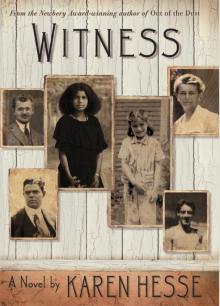 Witness
Witness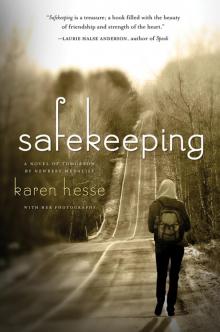 Safekeeping
Safekeeping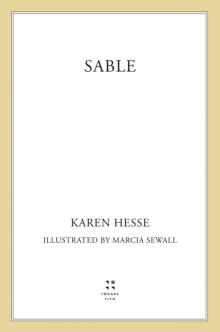 Sable
Sable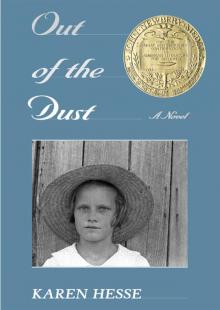 Out of the Dust
Out of the Dust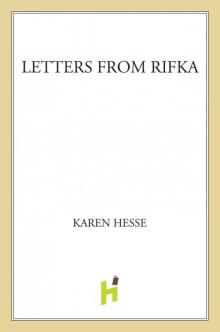 Letters From Rifka
Letters From Rifka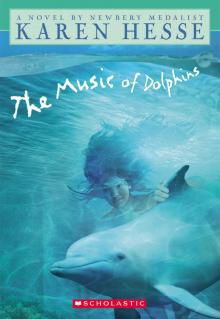 The Music of Dolphins
The Music of Dolphins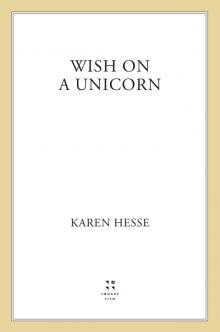 Wish on a Unicorn
Wish on a Unicorn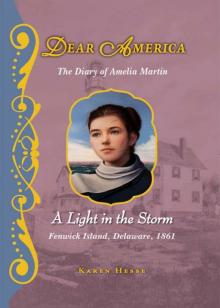 A Light in the Storm
A Light in the Storm